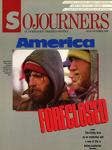I was sitting on the bank of a small, glacial lake just north of Oslo, with a view of a mountain covered with towering Norwegian pines. Towheaded children, with whom I could communicate only through smiles, waded in the cold water and laughed with delight at tiny fish that circled their feet.
I had encountered relatives of the fish - second cousins twice removed, perhaps, but in the same family, to be sure - just the week before. I was on a picnic with the young girls from our inner-city neighborhood with whom I study the Bible every week. They begged me by turn to catch the fish in paper cups for carrying from the stream to various jars and bowls at home deemed suitable by the girls for the fish's new existence. They longed for a piece of "the country" to carry back to the concrete and stifling summer heat of the city. Fortunately for the fish, they were well schooled in evasive maneuvers.
The memory of that day made me realize how far away home was. I was in Norway speaking at a Christian conference called "KORSVEI," which in Norwegian means "Crossroads." It was a place for Scandinavian Christians to meet, enjoy community together, and nurture discipleship.
I was invited to bring into the beautiful setting of lakes and pines a glimpse of "the other Washington" - the one that doesn't get covered in Norwegian newspapers. I talked about our Saturday morning food line, about piles of furniture on our streets that signal another eviction and people whose only homes are downtown steam grates.
MANY THINGS TOOK me by surprise in Norway - the mosquitoes, moose, and midnight sun in particular. I did not plan for a plague of insects so close to the Arctic Circle. Nor did I expect the bizarre spectacle that greeted a Swedish friend and me as we walked through woods one night at 1 a.m. A moose, looking like a huge brick wall on spindlelegs, ran out from the trees toward us, caught a whiff of our humanity, and turned a quick corner, legs seeming to fly in all directions. I especially did not expect to actually be able to perceive a moose at 1 a.m.; but in Norway on the second longest day of the year, it is like dusk at that hour.
The offered me exceptional care, making sure I didn't get lost in the language barrier - or the midnight sun - or the twilight zone of jet lag. The combination of jet lag and almost-ever-present sun made me unsure most of the time about whether it was time to wake up or go to sleep. So I reveled in long conversations about discipleship, community, and politics that went on late into the night - some until sunset.
On my first full morning in Norway, Thursday, June 26,1 received a phone call from a journalist at a Norwegian newspaper. "What is your reaction to the contra aid vote in the U.S. House of Representatives?" she wanted to know. It was the first that I heard that the aid had passed. I offered my opinion.
It wasn't until that evening as I spoke to the conference's 450 participants that the reality of the vote hit me. I shared a story from my trip three years ago with Witness for Peace to Jalapa in Nicaragua's northern frontier. I told about a Nicaraguan mother who had asked us to take her 6-month-old son to safety in the United States, as we raced by bus over the long and rutted road from Jalapa hoping to get to the town of Ocotal before a contra mortar attack. "I want Ricardo to grow up where there is no war," she pleaded.
Far from home, and far from Nicaragua, her suffering, and the increased suffering that was sure to come with the renewal of contra aid, were hard for me to bear. I just managed to finish the story and my talk before being overtaken with grief.
"It's just so hard," I found myself saying to Kjerstin, who the day before had helped me settle in and track down the luggage that had gotten temporarily lost between Kennedy Airport and Oslo. Now she offered a different kind of assistance. "Would it help to pray together?" she asked me. Having participated in a peace march across Central America, she felt devastated by the news of the vote as well.
We found a quiet corner and offered our prayers - she in Norwegian and I in English. We prayed for all the Nicaraguan sisters and brothers who had become friends, for our leaders, for our grief. We ended by praying, each in our own language, the Lord's Prayer.
It was a rich gift to be reminded of what I had first discovered in Nicaragua: We can always speak to one another in the language of compassion.
Joyce Hollyday was associate editor of Sojourners when this article appeared.

Got something to say about what you're reading? We value your feedback!
